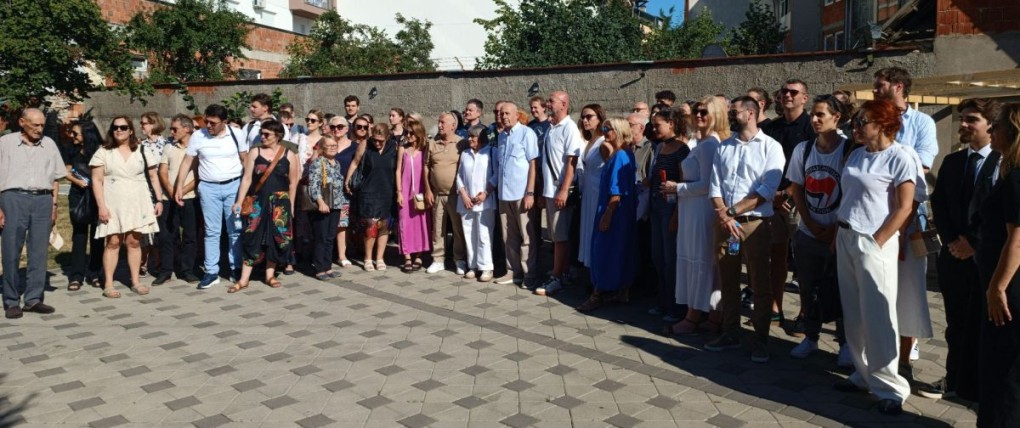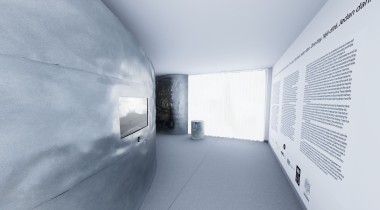The Humanitarian Law Center and Humanitarian Law Center Kosovo, as part of the REKOM Reconciliation Network, held the second day of the ‘Forum for Transitional Justice in Post-Yugoslav Countries’ at the Hotel International Prishtina on Sunday, which featured a series of panels and a visit to the Bogujevci and Duriqi families and the final resting places of the victims of the Podujevo Massacre.
The XVI Forum on Transitional Justice also featured the official promotion of the second volume of the Kosovo Memory Book, ‘Dignity for the Missing’ (1998-2000).
Activities were launched with a panel featuring several representatives from leading regional non-governmental organizations.
Nenad Golčevski, the head of the Humanitarian Law Center, stressed that a “very important part of reconciliation is creating and grasping the possibility for people from different sides and ethnic group to be able to deliberate on issues that affect them.”
“Deliberation presupposes that there is a joint good will to find common ground, and a deliberation based on virtues includes the acknowledgement of the other side,” he continued.
Bekim Blakaj, the head of the Humanitarian Law Center Kosovo, reflected on the frequent criticism faced by civil society actors from all sides of the political spectrum.
“Civil society of course has its limits and of course it has made mistakes, but we have learned a lot in the process. However, despite all this, the civil society in the region was capable of occupy the space that was left empty by our institutions, especially in terms of transitional justice,” Blakaj concluded.
Vesna Teršelić from Documenta in Croatia says non-governmental organizations in the country have had a hard time maintaining the same interest in transitional justice initiatives after they became the most recent Balkan country to join the European Union.
“In Croatia, we found interest and funding for dealing with transitional justice before it entered the EU. Now that Croatia is an EU member, people consider it a done deal and it is almost impossible to find support for continues to be an unfinished process,” she remarked.
The second panel discussion of the day was focused on how the experience and best practices in furthering transitional justice in the post-Yugoslav area can be applied to conflicts such as Ukraine and Gaza.
Heleen Habraken, an international crimes analyst with extensive experience in Ukraine, said that “the ICTY made a lot of effort to demonstrate to judges and the wider community that these are crimes that were committed as part of political strategies and people in high-ranking positions abusing their power.”
Jean-Daniel Ruch, an advisor and former ambassador to Serbia, Israel and Turkey and previously worked as an advisor to chief prosecutor at the ICTY Carla del Ponte, said “the one thing I learned is that the emotions, the anger that we have over these crimes, is the fuel that we should use to push us to fight for trials, solutions and an end to fighting.”
“Srebrenica has only been widely accepted as a genocide thanks to the trials at the ICTY,” continued Ruch. “It was also not victor’s justice, the ICTY looked at all crime scenes and prosecuted people of all ethnicities.”
In the second part of the day, forum attendees traveled to Podujevo to visit the site of the killing of 14 Kosovo Albanian civilians, of them mostly women and children, which took place on March 28, 1999 and was perpetrated by the Scorpions, a Serbian paramilitary organization and the Special Anti-Terrorist Unit of Serbia during the conflict in Kosovo.
The attendees were hosted by Enver Duriqi, Shemsi Duriqi, and Selatin Bogujevci with his daughter Jehona. Enver and Selatin retold the events of the tragic day in March when a total of 14 members of the Bogujevci, Duriqi and Llugaliu families were killed and the young children who survived, Jehona among them, were severely injured by gunshot wounds.
The Bogujevci family members also took the Forum attendees to the Manchester Peace Park, a humanitarian initiative that built the grounds for various activities to be organized in the city as a means to foster positive experiences for the locals and help them overcome the difficulties of the conflict.
The activities of the Forum wrapped up with a visit to an exhibition in central Prishtina titled “Media Coverage of the War”, focusing the role of international and local reporting on the conflict informing the wider public and shaping perceptions.


